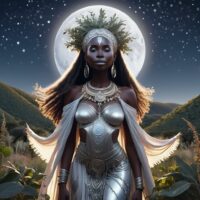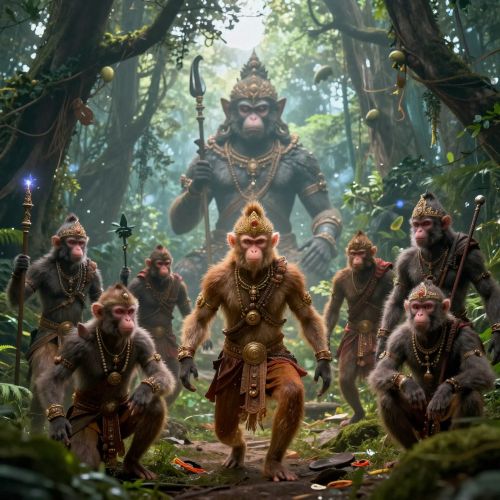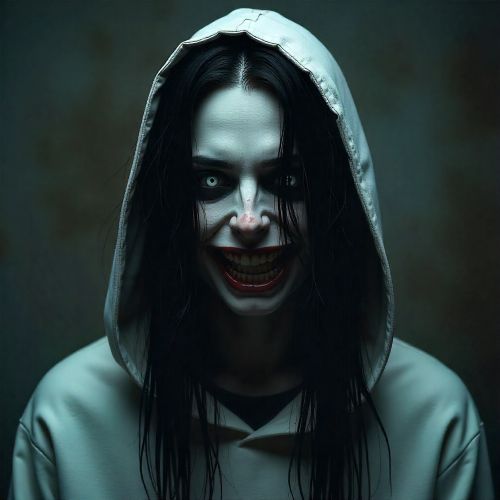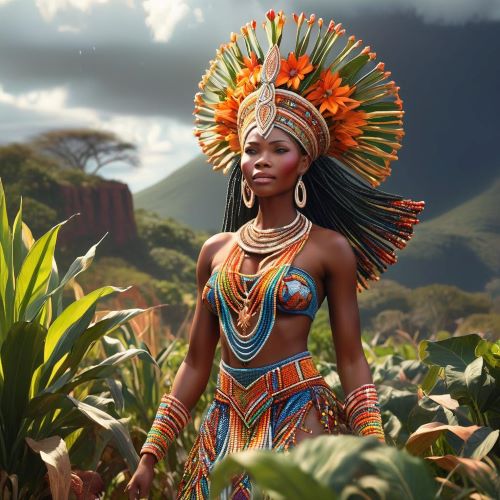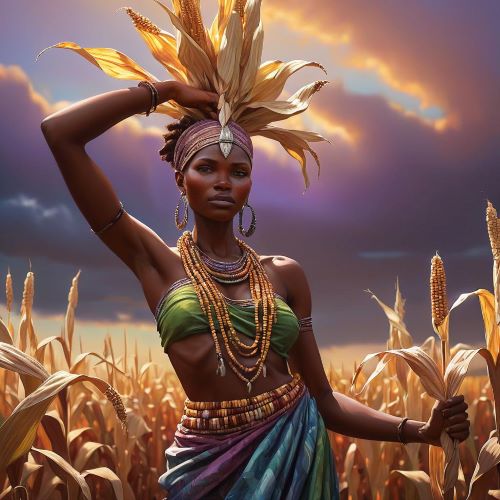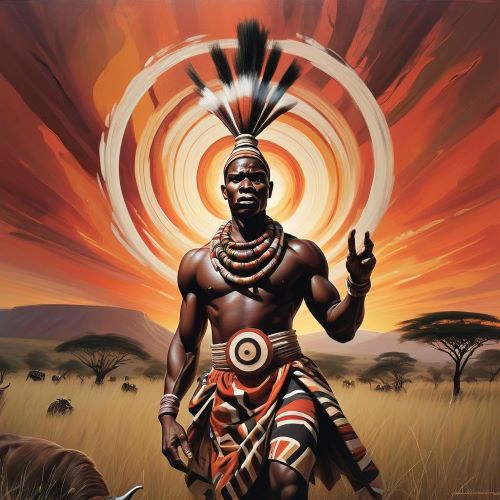Inyanga : Goddess of the Moon
Listen
At a glance
| Description | |
|---|---|
| Origin | Zulu Mythology |
| Classification | Gods |
| Family Members | N/A |
| Region | South Africa |
| Associated With | Moon, Healing, Fertility |
Inyanga
Introduction
Inyanga holds a vital place in Zulu mythology as both a celestial goddess and a central figure in traditional healing. The name “Inyanga” means “moon” in isiZulu, linking her directly with the lunar cycles that govern nature, time, and the body. She is revered not just as a lunar deity but also as a divine embodiment of healing, wisdom, and spiritual equilibrium. Her influence is deeply embedded in the cultural, agricultural, and medical practices of the Zulu people, where the moon’s rhythm sets the pace for rituals and remedies alike. As both a goddess and a title for traditional healers, Inyanga continues to illuminate the pathways of health and harmony in African communities.
Physical Traits
Inyanga is not typically represented in human form but is envisioned through the moon itself—radiant, shifting, and powerful. Her divine presence is tied to the moon’s glow and its influence on earthly life. In artistic and symbolic representations, she is often imagined as a luminous female figure surrounded by medicinal herbs and moonlight. Her essence is mirrored in the natural world’s cycles, with the waxing and waning moon seen as expressions of her dual forces: nurturing and cleansing. The healers who carry her name—known as izinyanga—often reflect this symbolic connection, dressed in traditional garments, adorned with organic jewelry, and always grounded in the natural world, especially during rituals under the night sky.
Family
Although there are no direct accounts of Inyanga’s mythological family in the traditional pantheon, she is understood to be part of a greater divine ecosystem. Her presence complements other Zulu deities, particularly those tied to the natural order. She is spiritually connected to Nomkhubulwane, the goddess of rain and fertility, whose influence works alongside Inyanga’s in regulating agricultural rhythms. In some oral traditions, Inyanga is considered a celestial counterpart to Unkulunkulu, the creator of all life, and Inkosazana, the goddess of maidenhood and fertility. These mythic associations weave Inyanga into a broader spiritual network where the moon, water, fertility, and healing intersect to maintain balance across realms.
Other names
The word “Inyanga” itself carries layered meanings. It not only denotes the moon but also refers to a traditional healer, a reflection of how spiritual and physical well-being are intertwined in Zulu culture. The plural form, “izinyanga,” is used to describe multiple healers, who are often wrongly labeled as “witch doctors” by outsiders—a misnomer that overlooks their respected and vital role. In spiritual communities and contemporary African-inspired wellness circles, Inyanga is sometimes honored with names like “Moon Mother” or “Lunar Healer.” These titles emphasize her nurturing energy, her influence on health and cycles, and her centrality in rituals rooted in both medicine and mysticism.
Powers and Abilities
Inyanga’s divine powers stem from her embodiment of the moon’s cyclical energy. As a deity, she governs healing, fertility, and the hidden knowledge passed down through generations. Her influence dictates when rituals are performed, when herbs are harvested, and how illnesses are diagnosed and treated in spiritual contexts. The izinyanga who serve in her name possess a vast understanding of the natural world, especially in the creation of medicinal mixtures drawn from roots, barks, and animal substances.
These healers also serve as counselors, spiritual advisors, and guardians of communal wisdom. Their abilities are believed to be awakened through ancestral calling, often marked by visions or illnesses interpreted as a sign from the spirits. Through initiation rites guided by dreams and ancestral voices, they gain the ability to diagnose spiritual imbalances, unearth hidden objects, and restore harmony between the patient and their environment. Inyanga, as a goddess, amplifies these gifts—she is said to oversee their rituals and to guide their hands through lunar insight, making her worship essential to the authenticity and potency of traditional healing.
Modern Day Influence
Inyanga’s impact remains deeply rooted in the fabric of South African life. Today, over 200,000 traditional healers practice across the nation, serving millions who continue to seek their wisdom. Despite the presence of Western medicine, about 80% of South Africa’s Black population still turns to traditional healers like izinyanga for spiritual and physical well-being. This enduring trust is supported by government recognition of Indigenous Knowledge Systems, which are being incorporated into formal education and public health conversations.
There is growing interest in how traditional practices can coexist with modern biomedicine. In many communities, patients consult both doctors and izinyanga, especially for illnesses perceived to have spiritual or social origins. Studies have even examined how these healers can influence brainwave patterns and other biofeedback mechanisms, offering promising intersections between ancestral healing and contemporary science.
Culturally, Inyanga continues to inspire literature, art, and spiritual expression. She is a symbol of transformation and feminine power, especially within movements that honor ancestral wisdom and nature-based spirituality. Her influence also extends into commercial and pop culture spheres. The name Inyanga appears in product branding, holistic health tools, and even speculative fiction, such as in spaceship designs inspired by African cosmology. Whether through ceremony or storytelling, Inyanga’s spirit thrives in both ancient traditions and modern innovations.
Related Images
Source
Lebarty. (n.d.). Zulu Mythology. Retrieved from https://lebarty.bongchong.com/zulu-mythology
Wikipedia contributors. (n.d.). Zulu traditional religion. Wikipedia. Retrieved from https://en.wikipedia.org/wiki/Zulu_traditional_religion
African Mythology Worldwide. (n.d.). The Myths of the Zulu: Legends from South Africa. Retrieved from https://african.mythologyworldwide.com/the-myths-of-the-zulu-legends-from-south-africa
Frequently Asked Questions
What is lorem Ipsum?
I am text block. Click edit button to change this text. Lorem ipsum dolor sit amet, consectetur adipiscing elit. Ut elit tellus, luctus nec ullamcorper mattis, pulvinar dapibus leo.
What is lorem Ipsum?
I am text block. Click edit button to change this text. Lorem ipsum dolor sit amet, consectetur adipiscing elit. Ut elit tellus, luctus nec ullamcorper mattis, pulvinar dapibus leo.
What is lorem Ipsum?
I am text block. Click edit button to change this text. Lorem ipsum dolor sit amet, consectetur adipiscing elit. Ut elit tellus, luctus nec ullamcorper mattis, pulvinar dapibus leo.
What is lorem Ipsum?
I am text block. Click edit button to change this text. Lorem ipsum dolor sit amet, consectetur adipiscing elit. Ut elit tellus, luctus nec ullamcorper mattis, pulvinar dapibus leo.
What is lorem Ipsum?
I am text block. Click edit button to change this text. Lorem ipsum dolor sit amet, consectetur adipiscing elit. Ut elit tellus, luctus nec ullamcorper mattis, pulvinar dapibus leo.


